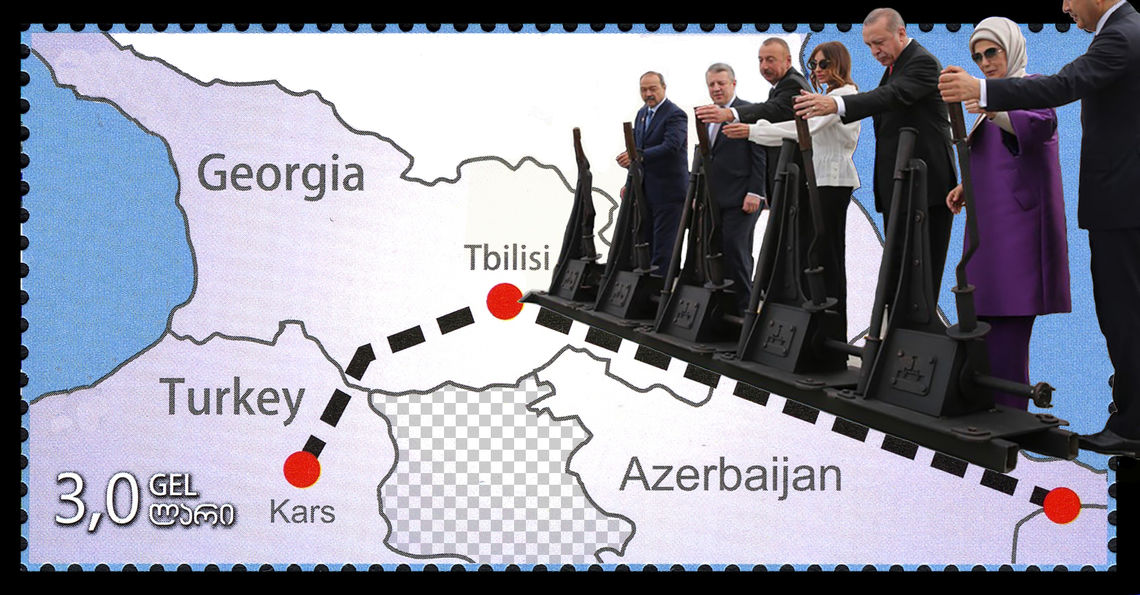Sun Nov 05 2017 · 6 min read
Opening of the Akhalkalak-Kars Railway: What to do Now?

By Vahram Ter-Matevosyan

Last week, on October 30, the Baku-Tbilisi-Kars Railway (BTK) better known as the Akhalkalak-Kars railway (AK) became operational. Even though the inauguration of the railway construction took place in 2007 in Marabda, Georgia, ten years on, the opening ceremony took place in Baku, far away from Akhalkalak or Kars. President Ilham Aliyev of Azerbaijan hosted his Turkish counterpart President Recep Tayyip Erdoğan, as well as the Prime Ministers of Georgia, Kazakhstan and Uzbekistan. The participants of the opening ceremony in Baku, particularly Erdoğan and Aliyev, spared no words to stress the geopolitical importance of the project.
The project was financed mainly by Turkey and Azerbaijan. Like two previous grand projects, the Baku-Tbilisi-Ceyhan oil pipeline and the Baku-Tbilisi-Erzrum gas pipeline, Baku stressed its name in the official title of the railway project too, even though the Baku-Tbilisi railway existed before. The actual construction of the railway included the following sections: (a) a 29-kilometer segment of the railway that aims to connect the city of Akhalkalak, Georgia with the Turkish-Georgian border; (b) a 76-kilometer segment of the railway starting from that border and reaching Kars, and thereby the Turkish railway network; (c) the building of a terminal in Akhalkalak which will allow transit of trains from Georgian wider track gauges to narrow Turkish ones; and (d) reconstruction of the 160-kilometer segment of the Akhalkalak-Tbilisi railway.
Much has been said and written about this project. There has been enough skepticism and doubt about its economic viability. Now that the railway has become operational, albeit with limited capacity, it remains to be seen whether it will live up to its expectations. Time will also tell whether it will serve as an alternative route to the existing ones and “an uninterrupted railway line from London to China” as Erdoğan claimed in the opening ceremony or whether it will attract enough interest among Central Asian or Chinese businessmen.
Armenia followed the events quite closely. The Akhalkalak terminal, which will serve as a major hub in the region and for the transportation of goods and passengers through the Akhalkalak-Kars railway, is only 30 kilometers from Armenia’s border. It is also 90 kilometers from Armenia’s second-largest city, Gyumri, and around 210 kilometers from the capital Yerevan. There have been speculations in Armenia that Azerbaijan would be in no position to influence Georgia’s decision to allow Armenia to benefit from the railway. That confidence was based on the assurances that various Georgian politicians were sharing with Armenians for years. They underlined that Georgia is a sovereign country and is in a position to decide whom to allow to use its transportation infrastructure.
“ A question should be raised on how much the Armenian authorities were able to reach out to the power corridors in Georgia and make a convincing argument about the importance of Armenia’s participation in the project. There are different ways to communicate with Georgian authorities and one of them is, of course, the official channel – the Armenian Embassy in Tbilisi. ”
Some 70-75 percent of Armenia’s foreign trade goes via Georgia, and the transit fees that Armenia pays are quite high. Armenia’s participation in that railway infrastructure could be yet another opportunity for Georgia to secure tangible income.
The Georgian government is also aware that the Akhalkalak terminal has been constructed in a region largely populated by ethnic Armenians. The Armenians of the Javakhk region can also benefit from the project, which will in turn increase Tbilisi’s attractiveness there. Other drivers also there indicate Georgia needs to be interested in Armenia’s participation in the Kars-Akhalkalak railway.
In addition to that dimension, a question should be raised on how much the Armenian authorities were able to reach out to the power corridors in Georgia and make a convincing argument about the importance of Armenia’s participation in the project. There are different ways to communicate with Georgian authorities and one of them is, of course, the official channel – the Armenian Embassy in Tbilisi.
On October 31, the day after the opening ceremony in Baku, the name of the new Armenian ambassador to Tbilisi was announced. Without knowing the recent events on the diplomatic front, one would speculate that it was a decision made by the Armenian government to raise the profile of the country’s diplomatic representation in Georgia. For several months before this appointment, another proposed appointee was waiting for Georgia’s agreement, however, it became obvious his candidacy had been refused. A number of questions linger about the profile of the new ambassador and the message that Armenia is sending to Georgia and to regional players.
Ruben Sadoyan, Armenia’s new ambassador to Georgia, was a member of a parliament from the ruling Republican Party from 2007-2017. However, for the wider public he is better known not for his unproductive years at the legislature, but for his business contacts with the former mayor of Yerevan, Gagik Beglaryan. It goes without saying that Mr. Sadoyan, a former tax-collector turned millionaire, was not the most successful candidate for this important post. During his ten years in parliament he never made a single statement nor did he ever introduce a draft bill. By appointing him, what message is Armenia sending to Georgia and to regional players? Given the importance of Georgia for Armenia, the latter should have sent one of its most experienced diplomats to Tbilisi to show that Armenia cares about Georgia and Armenia’s interests in that country. One can only wonder whether Mr. Sadoyan will able to propel that message forward. Of course, he is not the first in line of Armenian ambassadors to Georgia, who had no previous experience in diplomacy.
“ The Akhalkalak-Kars railway, according to Azerbaijani authorities, is not the final goal. In the future, they plan to extend it southward to Igdir then to Nakhijevan. ”
Armenia should change the way it works with Georgia and Georgian Armenians. Javakhk Armenians look to Armenia with hope that their concerns are being heard and considered in Armenia’s power circles.Their sense of marginalization from Armenia now goes even deeper as the railway became operational. The Armenian government should hear these concerns and let the Javakhk Armenians know about that.
One of the steps that Armenia can take is to organize a presidential visit to Javakhk. Since the collapse of the Soviet Union, only Levon Ter-Petrossian has been to Akhalkalak. The meeting of Armenia’s and Georgia’s leaders in Akhalkalak will send a significant message to the Javakhk Armenians. The other step that Armenia should re-initiate is to open a consulate in Akhalkalak which will send a strong signal to Turkey and Azerbaijan that Armenia cares about Javakhk and will not allow the marginalization of the region. The Armenian government should also negotiate with the Georgian authorities to revisit the existing tariffs of Georgian ports and transit fees. Armenian authorities should work closely with Georgian authorities to explore prospects of reopening the Abkhazian railway. Additionally, Armenian authorities should help their Georgian counterparts understand that Armenia needs a strong and sovereign Georgia as much as Georgia needs a reliable Armenia. Armenia’s concerns about the increasing influence of Turkey and Azerbaijan in Georgia’s economy and on some foreign policy choices are based on solid evidence. As recent mass rallies in Tbilisi showed, some parts of Georgian society and the Georgian Orthodox Church are also not at ease with these developments. This makes Georgia and Armenia partners and this ideas should be promoted in Georgia.
The Akhalkalak-Kars railway, according to Azerbaijani authorities, is not the final goal. In the future, they plan to extend it southward to Igdir then to Nakhijevan. This effectively means that Baku will be able to connect with Nakhijevan using the territory of Georgia and Turkey. Last week, the leaders of Russia, Azerbaijan and Tehran met in Iran to reconfirm their interests in the North-South transport corridor which aims to go through Baku. These processes confirm that Armenia should revise its regional communication policy.


